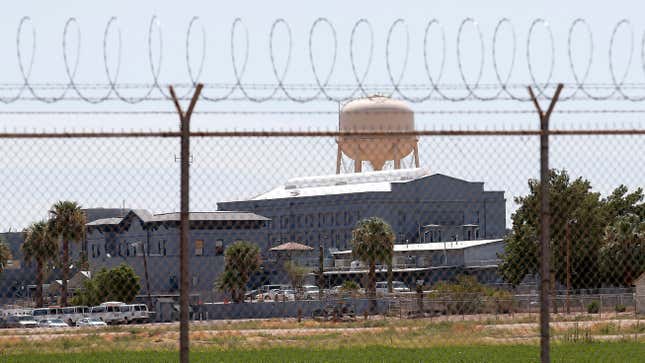
An Arizona law aimed at helping people with drug convictions earn early release from prison is reportedly being ignored in some cases due to flaws in state’s inmate management software, a Phoenix-area public radio station reported Monday, citing multiple government sources.
KJZZ, an NPR member station, reports that the inmate software, known as ACIS, is presently incapable of factoring in the early release credits earned by inmates—something the Arizona Department of Corrections (ADC) doesn’t deny. Whistleblowers within the department, however, told KJZZ that while prison employees are attempting the calculations manually, “hundreds” of inmates remain behind bars despite being eligible for release under the law.
The affected early release program was introduced in 2019 under Arizona Senate Bill 1310 and signed into law that year. It allows for prisoners convicted solely on certain drug charges to serve only 70 percent of their sentences, provided they’ve taken part in self-improvement programs offered by the state; career education, high-school diploma programs, or drug treatment, among others.
According to the Arizona Mirror, more than 7,000 people may have been eligible for release as of June 2019.
State employees, granted anonymity by KJZZ due to fear of retaliation, told the station that the ACIS software used to determine inmate release dates is currently incapable of identifying prisoners who’ve qualified for early release under the SB 1310 program.
The employees said correction department leaders have known about the problem since 2019.
The Arizona Department of Corrections confirmed in a statement to Gizmodo that its ACIS software is incapable of calculating early release dates for prisoners who’ve participated in SB 1310-eligible programs. The department denies, however, that any inmates have had their sentences prolonged by this, saying its employees are manually performing those calculations for thousands of inmates accurately.
“Release eligibility data is constantly monitored and [Arizona Department of Corrections] updates the calculation multiple times daily to ensure appropriate release times are calculated and acted upon,” an ADC spokesperson said.
“Beyond any automated sentence calculations, it is standard practice to review and validate sentence calculations manually to certify release dates,” they continued. “ADCRR has a record of accurate sentence calculations based on our current manual method. This has been the subject of litigation in the past and our method has been consistently upheld by Arizona courts.”
ACIS, or Arizona Correctional Information System, is a customized version of the Mi-Case Offender Management System developed by Business & Decision North America (BNDNA), a Pennsylvania-based corporation registered in Delaware. The same software is used in Maryland and Indiana state prisons, according to the company’s website.
In an email, BNDNA took issue with the ACIS issues being characterized as a “bug,” which is the word ADC used described the issue internally, according to records published by KJZZ. A spokesperson for the company said it’s “not uncommon for new legislation to dictate changes to software systems,” adding: “This translates to a change request and not a bug in the system.”
Gizmodo has pressed ADC & BNDNA to disclose when the “change request” was made and why the changes remain unimplemented. SB 1310 was signed into law more than 20 months ago. (An internal ADC document published by KJZZ requesting the change is dated October 22, 2020.)
KJZZ further reports that ACIS has experienced “more than 14,000 bugs” since its November 2019 launch, citing sources who say they warned department leaders early on not to launch the product. The sources told KJZZ that in response they were told to keep quiet and that too much money had already been invested in the program.
Update, 3pm: Criminal justice reporter Jimmy Jenkins, who first broke the story above, tweeted Monday afternoon that the Arizona Department of Corrections has blocked all employee access to the KJZZ website.
Update, 6pm: This article has been updated to include responses from the Arizona Department of Corrections and Business & Decision North America.